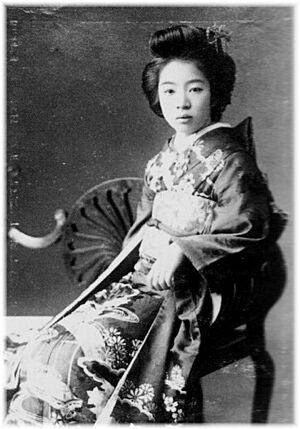Mari Mori facts for kids
Mari Mori (森 茉莉, born January 7, 1903 – died June 6, 1987) was an important Japanese writer. She was known for her unique stories and essays.
Early Life and Family
Mari Mori was born in Hongō, a part of Tokyo, Japan. Her father was a very famous novelist named Mori Ōgai.
Writing Career
Mari Mori started her writing career with essays. In 1957, she won an award for her collection of essays called My Father's Hat.
She later began writing novels. In 1961, her novel A Lovers' Forest (恋人たちの森 (koibito tachi no mori)) won the Tamura Toshiko Prize. Other books she wrote include I Don't Go on Sundays (1961) and The Bed of Dead Leaves (1962).
Her father greatly influenced her writing. In her stories, she often wrote about older, wise, and kind characters. These characters reminded her of the good qualities she saw in her own father.
In 1975, her book The Room Filled with Sweet Honey (甘い蜜の部屋 (Amai Mitsu no Heya)) won the 3rd Izumi Kyōka Prize for Literature.
Personal Life
Mari Mori married her first husband in 1919. They later divorced in 1927. Her second husband was Akira Sato.
Mari Mori passed away on June 6, 1987, due to heart failure.
See also
 In Spanish: Mari Mori para niños
In Spanish: Mari Mori para niños
 | Shirley Ann Jackson |
 | Garett Morgan |
 | J. Ernest Wilkins Jr. |
 | Elijah McCoy |


